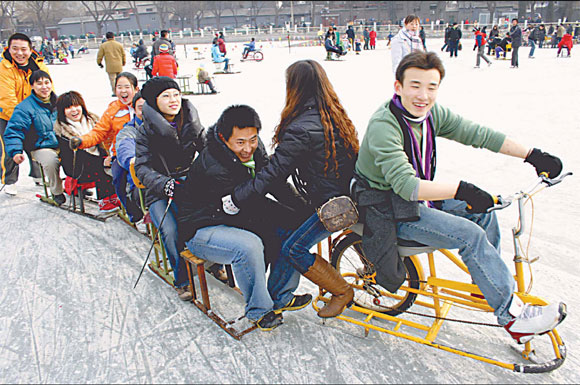Youngsters take a sleigh ride at Shichahai Lake in Beijing. Such outdoor activities can help keep one fit in winter. Huang Xiaobing
Zhao Zhixin says he was very busy all of last year, advising people how to keep healthy. His efforts have borne fruit, though, he says, because more and more people now practice what he preaches.
"At times, I get a call from a person just seeking a remedy for waist pain," says the Beijing-based health and exercise specialist who gets dozens of phone calls a day from people seeking health tips. "Follow my instruction, please. Lower your body and keep straight, squat down and go up." His advice could be as simple as that.
The remedy at times could be no more than just a set of body stretching exercises, he says. People that he helps and the media like to call him a "grassroots health promotion star". That's no surprise because he has been in the business for a decade.
People brave the icy winter in Qinhuangdao, Hebei, for a swim. Most of us, however, need not go to that extreme to keep fit. Liu Xuezhong
His commitment to public health began three decades ago, after he majored in physical education from Beijing Sport University and started teaching there. He shifted to another post later, to take up the general public's health as a fulltime profession. Official recognition came in 2000, when the General Administration of Sport appointed him State-level Social Health Instructor.
His importance and popularity peaked in 2006 as he began disseminating health knowledge on a TV program hosted by Beijing Television Station. The daily show with information capsules on health and disease prevention was the first health-themed program to be aired in the country. No wonder, it has got very high ratings and a large number of viewers.
The program coincided with people's rising demand to know about health and fitness, he says, making him feel the public needs more people like him today. In fact, public demand can be gauged from Beijing OpenBook's bestselling list, which gives information on the Chinese book market. The top three bestsellers in the non-fiction category last year were health and fitness books, OpenBook market analyst Zhu Jianhua says. Their sales jumped 32 percent.
A readership survey, conducted by China News Week and Sina.com recently, showed 82 percent of the 1,436 respondents had read a book on health or fitness, or would like to read one. A remarkable 73.3 percent said they were very familiar with such books, and already owned several of them. And more than half of the people supported publication of such books, with over 30 percent saying they had followed the books' guidelines and benefited from them.
"I've bought such books after seeing people around me do so," writes an online writer, who goes by the name of Xiao Mao and claims to be an IT worker in Beijing. "Sometimes they give useful tips to improve my health and point out the bad habits that can harm a person and lead to diseases. (The tips help because) I'm too busy to get enough exercise."
Why have books on how to stay healthy become a rage? Beijing-based physician Ji Xiaolong says that since many Chinese, especially those living in cities, are free from worries about food and clothing now, they have started paying more attention to their health to improve the quality of life further.
Another reason, Ji says, could be the drawbacks the overall medical care system suffers from.
Despite the government's concerted efforts to bring the entire population under a basic healthcare safety net, about 400 million people didn't have any medical insurance till last year, Minister of Health Chen Zhu said in a report submitted to the National People's Congress (NPC), the country's top legislature.
High medical costs have made it difficult for many people to see a doctor or get admitted to hospital. Medical experts say many of the diseases inflicting people today are incurable. "So prevention is far better than trying to cure them," senior citizen Lin Qing told China News Week in Fujian. "If such health books were available when we were young, I wound have been healthier now."
Echoing Lin's remark, Chen said disease control and prevention should come first. During his first official inspection visit to the Chinese Center for Disease Control and Prevention (CDC) in October, he said the health of 1.3 billion Chinese people couldn't be safeguarded by visits to doctors and taking medicines alone.
As health experts say, every 1 yuan spent on prevention would save the country 6 yuan on treating diseases. To realize that goal, the government has spent 10.5 billion yuan ($1.4 billion) to build 2,448 disease prevention and control centers across the country and link them via a computer network since 2003, Xinhua has reported.
The World Health Organization (WHO), too, asks countries to integrate prevention medical services into public healthcare to overhaul many costly and disabling conditions such as cardiovascular diseases, cancer and diabetes, which are linked to preventable risk factors.
But at present, most preventive medical measures in China don't come under the health insurance umbrella, though the State Council's preliminary blueprint for healthcare reforms released at the end of last year does highlight prevention. The government, however, is committed to spending more on healthcare, disease control/prevention and medical services.
"Disease prevention must be made the top priority of the country's health service," Chen said. If the healthcare model focuses on treating diseases, it would be difficult even for the most developed country to afford the heavy medical bill. And China is a huge country with a massive population, he warned.
"Why are health education and preventive services severely neglected? Because they do not guarantee hospitals' income. As a result, simple conditions are often treated at very high cost." That is WHO Director-General Margaret Chan's remarks speaking on China's case.
Subsidies provided by the Ministry of Health and its provincial and other local bureaus account for only 5 percent of the money the public or State-owned hospitals spend to keep going. Hence, hospitals choose to transfer their need for money to customers - the patients - to sustain their daily operations and boost staff pay.
Some hospitals reportedly "cash in" on patients' desperation by over-prescribing drugs and ordering unnecessary medical check-ups. The government is reforming the healthcare system to exactly redress this grievance. And the final reform plan is due to be released in March, shortly after the annual NPC meeting, the Guangzhou-based Modern Express quoted Chen as having said.
The government has launched a series of practical public health campaigns, mainly to raise people's health awareness. The Beijing health administration, for instance, began free distribution of spoons and pots designed to set daily limits for salt and cooking oil consumption from last year.
Health comes from daily routine living, says Henk Bekedam, former chief China representative of WHO. Despite great efforts and progress in public health, China still faces a lot of challenges, including obesity, high blood pressure and cardiovascular diseases. "These are highly preventable," Bekedam says. And the only way to prevent them is by developing good living habits and exercising regularly.
(China Daily January 25, 2008)




